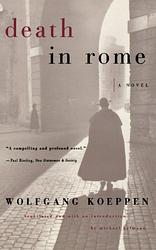Death in Rome by Wolfgang Koeppen
"Death in Rome" is a post-World War II novel that explores the lives of a German family, their friends, and associates during a reunion in Rome. Each character is representative of a different aspect of German society, and their interactions and experiences in the city serve as a commentary on the nation's struggle to come to terms with its recent past. The book also explores the themes of guilt, denial, and the lingering effects of war.
The 2355th greatest book of all time
- Published
- 1954
- Nationality
- German
- Type
- Fiction
- Pages
- Unknown
- Words
- Unknown
- Original Language
- German
If you're interested in seeing the ranking details on this book go here
This book is on the following lists:
- 1001 Books You Must Read Before You Die (The Book)

